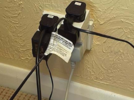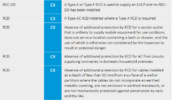- Joined
- 27 Jan 2008
- Messages
- 27,761
- Reaction score
- 3,365
- Location
- Llanfair Caereinion, Nr Welshpool
- Country

I did look, cooker, washing machine, and immersion heater. I looked at the instructions for my washing machines, and neither ask for RCD protection, with the immersion heater I would prefer the RCD to trip if the element fails, and I know cookers can have problems with damp getting into the elements, so all three items have mineral insulated elements and can see why not having an RCD may be a good thing.
So can see the argument both sides as to if RCD protection or not for those circuits.
The EICR has the code C2 defined as "potentially dangerous", and I would agree hard to see why when feeding the three items shown on the CU labels it would be considered as "potentially dangerous"? It may not comply with BS 7671 as a new install, but code 4 was removed from the EICR so we no longer have the option of giving it a code 4.
However it is up to the inspector as to what codes he issues, not us. He could decide with LED lights one needs a type A not AC RCD, I think that would be rather OTT, however it is up to him what codes he uses, most of us would use the best practice guide 4, however I Don't agree with all it says to me this to my mind is not a fail, bad practice yes, but to say more sockets must be fitted on an EICR to me is going OTT, so we have
to my mind is not a fail, bad practice yes, but to say more sockets must be fitted on an EICR to me is going OTT, so we have  and
and  for the C2 and C3 codes relating to RCD's so Best practice guide 4 does seem to say that should not be a fail. But at end of day it is up to the person testing not the person writing the guide or us, and it is likely cheaper to fit the new CU than get some one else to test it.
for the C2 and C3 codes relating to RCD's so Best practice guide 4 does seem to say that should not be a fail. But at end of day it is up to the person testing not the person writing the guide or us, and it is likely cheaper to fit the new CU than get some one else to test it.
So can see the argument both sides as to if RCD protection or not for those circuits.
The EICR has the code C2 defined as "potentially dangerous", and I would agree hard to see why when feeding the three items shown on the CU labels it would be considered as "potentially dangerous"? It may not comply with BS 7671 as a new install, but code 4 was removed from the EICR so we no longer have the option of giving it a code 4.
However it is up to the inspector as to what codes he issues, not us. He could decide with LED lights one needs a type A not AC RCD, I think that would be rather OTT, however it is up to him what codes he uses, most of us would use the best practice guide 4, however I Don't agree with all it says to me this
 to my mind is not a fail, bad practice yes, but to say more sockets must be fitted on an EICR to me is going OTT, so we have
to my mind is not a fail, bad practice yes, but to say more sockets must be fitted on an EICR to me is going OTT, so we have  and
and  for the C2 and C3 codes relating to RCD's so Best practice guide 4 does seem to say that should not be a fail. But at end of day it is up to the person testing not the person writing the guide or us, and it is likely cheaper to fit the new CU than get some one else to test it.
for the C2 and C3 codes relating to RCD's so Best practice guide 4 does seem to say that should not be a fail. But at end of day it is up to the person testing not the person writing the guide or us, and it is likely cheaper to fit the new CU than get some one else to test it.